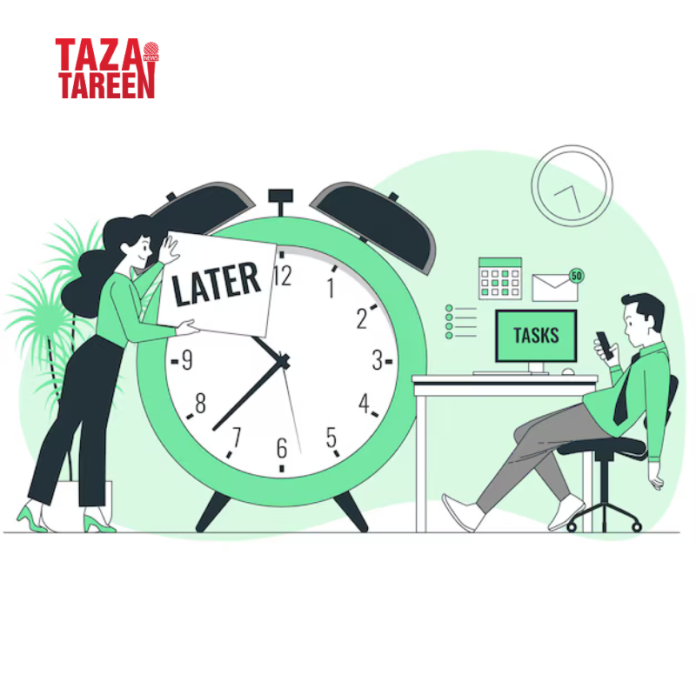We all experienced familiar feeling of procrastination when we recognize we need to hit the books or indeed work. We find ourselves opening up Facebook, cleaning out the fridge, or seeing one more video. You promise yourself that you are going to start in the next five minutes, and you spend hours. Deadlines loom. Stress builds. But you are still stuck.
Procrastination does not mean to be lazy. It goes beyond the surface. It is one of the pitfalls into which many are lured and in many issues we might not even know the reasons why. Dr. Piers Steel, who wrote a book titled The Procrastination Equation, indicates that around 20 percent of the adults consider themselves tired procrastinators. And in the world of distractions today that number is probably increasing.
The article will analyse why we engage in procrastination, its impact in our lives, and the strategies that have been tried, and proven to be effective in enabling us rather finally break the habit.
What is Procrastination?
Procrastination is the act of delaying or postponing tasks, especially ones that are important or time-sensitive. Engaging in doing things for too long is not just an issue of poor time management but one that is an emotional avoidance-based avoidance behavior. Procrastination and laziness should be distinguished. The issue with laziness is that one does not want to do anything. Procrastination instead is an inclination to do something yet do something different and it is a choice to do so, not often something eagerly important or pressing. There are different types of procrastinators:
- The Perfectionist delays because they fear their work won’t be good enough. The Thrill-Seeker waits until the end moment to get the adrenaline.
- The Avoider is panic stricken or has a feeling that the situation is too much to handle thus he escapes the task.
Recognizing which type you are is the first step to overcoming it.
The Psychology Behind Procrastination
The essence of procrastination is fighting between you and your future self. Your today self seeks goodness and the instant gratification, whereas your tomorrow self demands success, discipline and advancement.
Here are a few psychological factors that explain why we procrastinate:
1. Dopamine and Instant Gratification
When you go on your phone and check Facebook or Instagram, watch Netflix, or play video games, your brain releases dopamine, the “feel-good” chemical. The immediate gratification is much more appealing than the delayed gratification of the accomplishment of an arduous task.
2. Fear of Failure
Many people avoid starting work because they’re afraid it won’t be good enough. This perfectionism leads to paralysis. The logic becomes: “If I don’t start, I can’t fail.”
3. Decision Fatigue
Decision-making capabilities of our brains are constrained on a daily basis. By overworking our time or even procrastinating our duties, we develop mental fatigue and we are easily susceptible to distractions.
4. The Present Bias
It is a mental bias that makes us overestimate the short-term gains to the detriment of long-term ones. That is why immediate gratification is more gratifying than planning rewards long-term despite acquiring knowledge that long-term goals are better.
Real-Life Consequences of Chronic Procrastination
Procrastination is not a big deal at first, yet in the long-term perspective, it is quite dangerous as it causes noticeable backslides in the life of a person:
- Lost opportunities: The precious time passes away and the chances are lost and the dreams remain unfulfilled.
- Higher stress and anxiety levels: The longer you postpone, the higher pressure is created.
- Complicated performance: The last-minute work is hardly ever your finest work.
- Low self- esteem: the inability to follow through develops a bad self-image.
7 Practical Strategies to Beat Procrastination
You don’t need to become a productivity guru overnight. Small, consistent changes can rewire your habits and boost focus.
1. The 2-Minute Rule
Once a task can be done in less than two minutes, do it. It is an easy means of getting the ball rolling and avoiding a log jam.
2. Pomodoro Technique
Get it done, in spurts or small doses (usually 25 minutes) then take a 5-minute break. When a game is four down, make it a longer break.
3. Time Blocking
This will make your brain fresh and alert. Make up schedules of the day in blocks. Each block should have a particular task or a kind of work.
4. “Eat That Frog” Method
It is simpler to avoid them when you have a calendar that determines your activities. From among all the worst and unpleasant jobs, start the day with the first one.
5. Habit Stacking
When you do that, then everything seems to be simpler. Connect a new habit with something you do. In this case, the example will be to write 100 words after making coffee. This brings about a stimulus and consistency is simplified.
7. Environment Design
Tell someone your goal or make it public. Knowing others are watching boosts your chances of follow-through.
Share your intention with somebody or share it. It increases the likelihood of you following through knowing that people are observing. The environment influences your behaviour. Clear your desk, turn off your phone and make an environment that induces deep work.
Long-Term Habits for a Productive Mindset
It does not depend on willpower only to beat procrastination, but rather on the formation of the right habits and identity. Here is how to keep maintaining consistencies over the time:
- Concentrate on being consistent rather than being perfect. It does not signify failure because of missing a day.
- Measure your progress. Any win is composed of smaller wins.
- Practice self-compassion. There is no need to feel bad that you procrastinate. Shame on yourself not.
- Reflect regularly. Review or journal your week. What worked? What didn’t?
Final Thoughts: Progress Over Perfection
Procrastination can feel like a heavy weight, but it’s not permanent. You’re not lazy, broken, or incapable. You’re simply human — and your brain is wired to seek comfort. The key is to take action before motivation kicks in. Action leads to momentum, and momentum builds discipline. Start with one small step — today. Not tomorrow.


